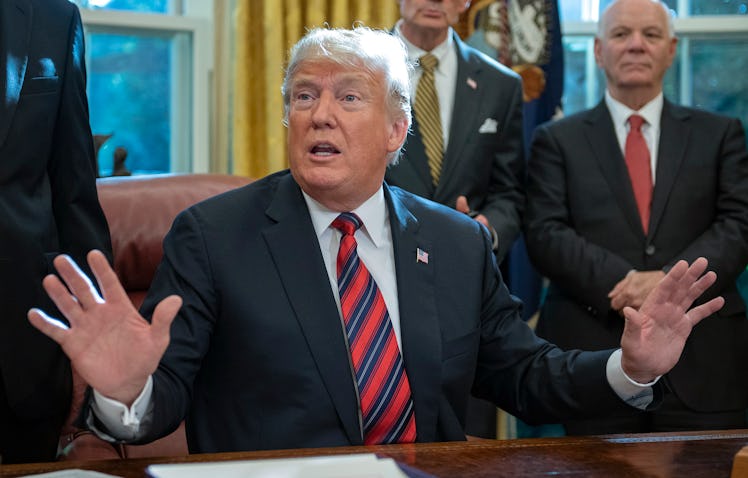
Donald Trump Wants To End Citizenship By Birth, But It's Not That Simple
Over the past year, immigration has come under direct attack by the Trump administration, from the highly-controversial "zero tolerance" policy to the president ending the DACA program, which protected 800,000 young immigrants from deportation. And now, there's another major idea that could have drastic effects. President Donald Trump said that he's planning an executive order to end birthright citizenship, which gives any child born on U.S. soil the right to American citizenship. Naturally, many people are in panic mode, wondering: can Donald Trump actually end birthright citizenship? Well, the good news is that it looks like it'd be a lot harder to pull off than Trump let on.
Trump announced that he was planning an executive order to end birthright citizenship, also known as jus soli, in an Oct. 30 interview with Axios. Such a move would fundamentally rewrite the 14th Amendment of the Constitution, which states, "All persons born or naturalized in the United States and subject to the jurisdiction thereof, are citizens of the United States" — and as The New York Times points out, Trump doesn't have the power to change it. Though he maintained otherwise in the interview, amendments can only be proposed with a two-thirds majority in both houses of Congress, or when a constitutional convention is called for by two-thirds of state legislatures. And there would have to be a solid reason behind taking the action, which Trump, for one, doesn't seem to have. Elite Daily reached out to the White House for further comment on Trump's reasoning behind trying to end birthright citizenship, but did not immediately hear back.
Speaking of his reason behind the step, Trump told Axios:
We’re the only country in the world where a person comes in and has a baby, and the baby is essentially a citizen of the United States for 85 years, with all of those benefits. It’s ridiculous. It’s ridiculous. And it has to end.
But the truth is, according to fact-checking site PolitiFact, there are at least 33 countries with birthright citizenship laws, including Canada and Mexico. The United States and Canada are the only two “developed” countries, as defined by the International Monetary Fund, that don't have restrictions on birthright citizenship laws, though.
Trump's plans have already seen some outcry. Laurence H. Tribe, professor of constitutional law at Harvard Law School, tells Elite Daily via email, "President Trump’s threat to end birthright citizenship by executive order is legal nonsense." The American Civil Liberties Union (ACLU) also hit back at Trump on Twitter, calling his plans "blatantly unconstitutional."
In any case, Trump might not even be serious about his plans. His comments come less than a week before the Nov. 6 midterm elections, and Trump has been going all-in on immigration in the closing stretch of the race in hopes of securing Republican control in Congress. Most recently, he's latched onto the immigrant caravan traversing Mexico. Although the migrants are seeking refuge from violence and poverty, Trump has repeatedly attacked them anyway — like on Oct. 29, when he tweeted out a message to his 55 million Twitter followers calling the caravan an "invasion" by "many gang members" and other "very bad people." Elite Daily reached out to the White House for further comment on Trump's claims, but did not receive a reply by the time of publication.
That same day, he announced he would send 5,200 troops to the U.S. southern border in response to the caravan, which some viewed as an effort to stoke immigration fears ahead of the midterms. There was also the time on Oct. 19 when he referred to the migrants as "hardened criminals." When he got called out about it, he failed to offer up a legit justification for his comment. Elite Daily reached out to the White House for further clarification, but did not hear back. So who knows how far his plans will get.
The full Axios interview reportedly airs on Nov. 4, so hopefully more details emerge then.